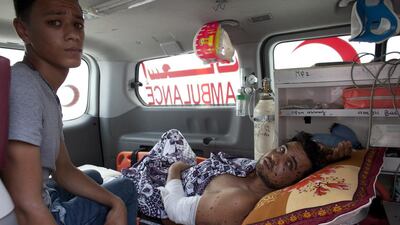ARISH, EGYPT // Ayman Saadi was sitting outside his apartment building near the Gaza coast taking in a breeze during a power cut when an Israeli Apache helicopter blew up a nearby car.
The explosion killed the driver and injured 11 of Ayman’s family and friends. His son, 18-year-old Saadi, had a portion of his spleen ruptured by the blast.
With Gaza's hospitals struggling with the huge numbers of casualties from Israel's relentless attacks his best chance was to get him across the border to Egypt. "When you see your son being treated, of course you feel happy," said Ayman, a 38-year-old trader, who still managed a smile at the Arish Public Hospital in North Sinai, a few kilometres from the Egypt-Gaza border. "We're grateful to Egypt for letting us in."
Saadi is one of the few Palestinians that have been let into Egypt to receive medical treatment since Israel’s Operation Protective Edge started on July 7, which has killed at least 184 Palestinians, mostly civilians, and injured more than 1,280.
Despite Egypt’s expressions of solidarity with Gaza’s population, its actions on the Egypt-Gaza border show a reluctance to take on too much responsibility for a problem that could have consequences on Egypt’s already tense domestic climate.
Egypt’s diplomatic response has also been tentative.
Cairo condemned the unrelenting bombardment of Gaza, which Israel says is in response to rockets launched by militants from Hamas, the Islamist group that controls the territory.
On Saturday, Quartet Representative Tony Blair met with Egyptian president Abdel Fattah El Sisi to discuss Egypt’s efforts to end the violence. Egyptian prime minister Ibrahim Mehleb said Egypt’s extensive calls to Israel have been met only with “stubbornness and escalation”.
Egypt's approach marks a contrast to the leadership shown in November 2012 when the Islamist former president Mohammed Morsi mediated a ceasefire deal between Hamas and Israel after eight days of conflict. Mr Morsi dispatched Egypt's then-prime minister Hisham Qandil to Gaza less than 48 hours after violence began.
Mr Morsi, a member of the Muslim Brotherhood, was removed from power in July 2012 by the Egyptian army after a mass wave of protests calling for him to resign.
Hundreds of Brotherhood supporters were killed as the security forces cleared their sit-ins and Egypt declared the Brotherhood a terrorist organisation in December. Egypt also destroyed the tunnels into Gaza, which were used to smuggle in goods to the besieged population and weapons to Hamas, a Muslim Brotherhood offshoot considered a terrorist group by Israel and the US.
The Rafah border crossing to Gaza, which Egypt controls, has mostly remained closed since Israel’s bombardments began last week, and some medical delegations have been denied entry.
It has opened for only a few hours at various times since July 7. Nineteen injured Palestinians have been let through and foreign passport-holders living in Gaza are being allowed to flee, though some complain that the process of exiting Gaza to Egypt has been taking too long. An Egyptian army-led convoy says it has delivered food and medical aid, as have the non-governmental Egyptian Red Crescent and Arab Medical Union.
At Arish hospital, Islam Hussein Ahmed, head of public relations, remembers its halls being “crowded with the injured” in November 2012 and during Israel’s Operation Cast Lead in 2008-2009 which killed 1,400 Palestinians. He is surprised at the low numbers they’ve received so far, “compared to the numbers of injured we see on television,” he said.
Half of those let in are being treated in Arish, while the rest are in Cairo.
Fikr Shaltoot, Gaza programme manager for the charity Medical Aid for Palestinians, said the decision of who to send to Egypt is made by a committee at the Gaza Health Ministry.
“Many more of those injured this time compared to 2012 are in critical conditions,” Ms Shaltoot said. “They have to be able to make the journey.”
The distance between Al Shifa Hospital in Gaza, where most Palestinians are being treated amid medical supply shortages, and the Rafah crossing is a 45-minute drive. Then there is a hour-long procedure at the border before another one-hour journey from Rafah to Arish hospital.
Negotiations are taking place between Gaza officials and Israel on the possibility of sending injured Palestinians to East Jerusalem, which is a shorter distance than Egypt, she said.
One of the major concerns for Egyptian officials is the prospect of “terrorists” coming into Egypt along with the injured from Gaza, a security source in Arish said.
Egypt has been battling militants targeting security forces over the last year.
Among the first group of injured Palestinians to come through to Egypt on Thursday only 11 were let through. Just one man, who was in a coma, was allowed to have a person accompanying him. These conditions have since eased; all injured Palestinians are now coming in with a close relative accompanying them.
Still, some would like Egypt to respond with more “humanity”, said Nasser Rady, an Egyptian government employee whose daughter lives in Gaza.
Mr Rady has been waiting at the Rafah border crossing over the last week hoping to get in and bring his daughter back to Egypt.
“She is too terrified to leave the house because of the bombing and destruction happening all around her,” he said. “I’m hoping that when she sees me, she’ll no longer be afraid.”
foreign.desk@thenational.ae

